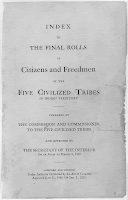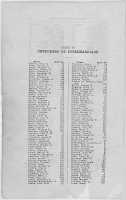This is the Title page of the Dawes Roll:

This is a sample page of the Cherokee by Blood section of the Dawes Roll:

Another list gives you Cherokees by Intermarriage - now this can be confusing, since at one time the BIA or in those days the Indian agency or commission allowed Cherokee by Intermarriage but by the early 1900s there is a Commission case which disallowed Cherokee by Intermarriage - so in other words if you were white and you married a Cherokee, you were no longer considered Cherokee by Intermarriage.


Now we come to the Final Rolls - this one is for the Cherokee Freedmen:

This is a page from the Delaware Cherokee - no one questions that the Delaware are Cherokee, we just know that not to be true - but you see in the early 1900s, it was an insult to the Indians to include the Delaware as Cherokee - we know they're a separate tribe - but this again shows the lack of respect by the U.S. authorities as to the true nature of Cherokee or Delaware for that matter. Still going on today.

And here is that infamous final roll of Cherokee, showing the blood quantum on their census cards - this was done for all the Five Civilized Tribes - my interest here is only the Cherokee:

The only people in these records listed with a blood quantum are those who were Cherokee or Delaware, now we know the Delaware are not Cherokee, so that must be their stated Delaware Blood.
A 100 years later, Congresswoman Watson would have us go back and second guess what determinations were made by the Dawes Commission - well, in that case, she should be prepared to check the records of all the blood quantum, since very few believe them to be correctly stated. She should also require the U.S. to list a blood quantum for all those descendant from say an Irish ancestor or German Ancestor or yes, just exactly what part Black is Congresswoman Watson.
And what about our Hispanic neighbors - just what part Hispanic and white are they?
Now all of these Indians by Blood were determined so that the U.S. could dole out land allotments to Cherokees, rather than allowing the Nation to have all it's land in trust. So likewise what is the point of a remaining blood quantum. Well, that is how benefits to the Indians are doled out to the Indians today.
So where is Congresswoman Watson's legislation to rid the Nations of the federal regulations of Blood Quantum requirements? or the restrictions of use of Federal Funding that is doled out to territorial boundaries? If you say, I couldn't find any such introduced legislation, you are quit correct, there is little concern on Watson's part for the Cherokees unless you are a Freedman .
Comments